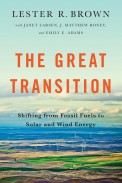Wednesday, September 24, 2014
Twenty years ago, Lester Brown published an article in World Watch magazine titled “Who Will Feed China?” A year later, he followed with a book of the same name.
The article and book generated an enormous outcry from China and dozens of conferences, seminars, and studies, as he writes in his autobiography, Breaking New Ground.
"In 1994 I wrote an article for the September/October issue of World Watch magazine titled “Who Will Feed China?” The late August press conference releasing it generated only moderate coverage. But when the article was reprinted that weekend on the front of the Washington Post’s Outlook section with the title “How China Could Starve the World,” it unleashed a political firestorm in Beijing. …
The World Watch article attracted more attention than anything I have ever written. In addition to appearing in our magazine’s five language editions—English, Japanese, Chinese (Taiwan), German, and Italian—it also appeared in abridged form in many of the world’s leading newspapers, including the Washington Post, Los Angeles Times, and the International Herald Tribune. It was syndicated internationally by both the Los Angeles Times and The New York Times. Among the other major news organizations covering the analysis were the Associated Press and The Wall Street Journal, including the Asian edition. …
One of the most interesting responses was in Washington, DC, where the National Intelligence Council, the umbrella over all the U.S. intelligence agencies, analyzed the effect of China’s growing demand for grain on world agriculture and any security threats that it might pose. A panel of prominent researchers, led by Michael McElroy, then head of the Department of Earth and Planetary Sciences at Harvard, produced a first-rate study of several hundred pages. …
Meanwhile, within China, every few weeks another study was released attempting to demonstrate why my analysis was wrong. These critiques came from such disparate sources as a scientist from the Chinese Academy of Sciences, an official from the Ministry of Agriculture, and an independent academic scholar. Not long after, an enterprising Chinese publisher took a copy of the original World Watch magazine article and a collection of the critiques of it and published them in a book titled The Great Debate Between Lester Brown and China. …
Over time, China’s leaders came to both appreciate and acknowledge how Who Will Feed China? had helped change their thinking. A late 1998 issue of Feedstuffs, a weekly agribusiness newspaper, quotes Lu Mai, an agricultural economist and senior fellow at a government think tank in Beijing, as saying, “Brown seems to have been accorded guru status in high places. ‘He’s like the monk from outside who knows how to read the Bible.’” …
Lester proved prescient in his analysis. China is a leading importer /blog/who_will_feed_china/of_grain_and_it_imports_a_staggering_60_percent_of_all_soybeans_entering_world_trade_mdash.css;and it looks like it will continue. The problem is not so much population growth, but China’s rising affluence, which is allowing its population to move up the food chain, consuming more grain-intensive livestock, poultry, and farmed fish.
Janet Larsen, EPI’s director of research, wrote last year on the Chinese purchase of Smithfield, the world’s leading pork producer. She has also written on how China’s meat consumption has grown to double that of the United States where meat consumption is falling.
Essentially, twenty years later, we are still wondering who will feed China?
Lester has written a number of articles over the last dozen years about China, which are available on Earth Policy Institute’s website. Below are some highlights.
Cheers,
Reah Janise Kauffman
P.S. For those of you in the DC area, on Tuesday, September 30, he will be speaking at the Wilson Center in Washington, DC, on “China’s Quest for Safe + Secure Food: Boon for U.S. Business?” RSVP here.
Can the World Feed China?
/plan_b_updates/2014/update121
China’s Rising Soybean Consumption Reshaping Western Agriculture
/data_highlights/2013/highlights34
Peak Water: What Happens When the Wells Go Dry?
/plan_b_updates/2013/update115
Learning from China: Why the Existing Economic Model Will Fail
/data_highlights/2011/highlights18
Iowa Eclipses Canada in Grain Production, Challenges China in Soybean Production
/data_highlights/2011/highlights16
Can the United States Feed China?*
/plan_b_updates/2011/update93
Learning from China: Why the Western Economic Model Will Not Work for the World
/plan_b_updates/2005/update46
China's Shrinking Grain Harvest: How its Growing Grain Imports Will Affect World Food Prices
/plan_b_updates/2004/update36
China Losing War with Advancing Deserts
/plan_b_updates/2003/update26
Page 1 of 1 pages


